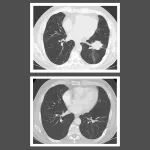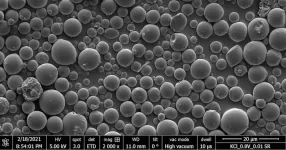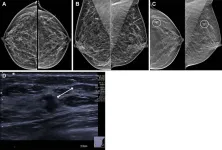(Press-News.org) The number of insects has been declining for years. This has already been well documented for agricultural areas. In forests, however, temporal trends are mostly studied for insect species that are considered pests. Now, a research team led by the Technical University Darmstadt have studied the trends of very many insect species in German forests. Contrary to what the researchers had suspected, the results showed: The majority of the studied species are declining. The results have been published in the scientific journal Communications Biology.
Forests in Central Europe have recently come to the public's attention due to their importance for climate mitigation and due to the omnipresent forest damage as a result of hot and dry summers. In addition to humans, many animal species depend on forest ecosystems, most of which are insects. Insects are often considered only as pests in the forest, as is shown, for example, by reports on bark beetles or cockchafers. While temporal changes in populations of potential insect pests are well studied, little is known about the status and trend of the many other fascinating insect species in forests.
A new study led by researchers from the Technical Universities of Darmstadt and Munich in collaboration with other researchers now shows how the populations of 1,805 insect species have developed in German forests from 2008 to 2017. To the researchers' surprise, the number of individuals has declined over time for the majority of the evaluated species.
This is particularly surprising when compared to agricultural land, where the type of land use has changed over time and intensified, for example due to more effective pesticides, the removal of edge structures, or increased cultivation of corn. Disturbances of this type do not play a role in forests. Nevertheless, a clear decline in forest species was demonstrated, with larger and more abundant species declining particularly. While slightly more species increased than decreased in herbivorous insects, significantly more species decreased in all other feeding types such as predators or deadwood decomposers.
The new study was conducted as part of the "Biodiversity Exploratories," an interdisciplinary infrastructure priority program funded by the German Research Foundation (DFG) since 2006, in three regions: the Hainich National Park, the UNESCO Biosphere Reserve Schorfheide-Chorin and the UNESCO Biosphere Reserve Swabian Alb. The decline was greater in forests with a high proportion of conifers, such as spruce and pine, which are naturally rare in the study areas but have been planted in the past. In contrast, losses of insects were lower in native beech forests. Furthermore, in unmanaged protected forests, the declines were less severe than in intensively managed forests.
With this to date most comprehensive study on insect decline in Central European forests, the authors show that insects are not only declining in agricultural landscapes - as previously demonstrated - but also in forests, which cover almost a third of the land area in Germany.
“More than 60 percent of the studied insect species have been declining” says the lead author of the study, Dr. Michael Staab from the Ecological Networks Groups of the Department of Biology at the Technical University Darmstadt. "This will very likely have an impact on all organisms in our forests as food webs may be altered." In light of climate change, future research is needed to unravel how increasing drought and the resulting changes in native forests will affect insect population trends.
Professor Nico Blüthgen, head of the Ecological Networks Group, adds: "Our forests are undergoing drastic changes due to the climate crisis. We are currently trying to understand how this affects insect populations." The results of the study, now published in the international journal “Communications Biology”, suggest that targeted management, including promoting a more natural tree species composition and reduced tree harvest, can help mitigating insect decline in our forests.
Further information
Research platform Biodiversity Exploratories: www.biodiversity-exploratories.de/en/
Contact:
Dr. Michael Staab
Department of Biology
Ecological Networks
E-Mail: michael.staab1@tu-darmstadt.de
Tel: +49-6151/1675416
The publication
Michael Staab, Martin M. Gossner, Nadja K. Simons, Rafael Achury, Didem Ambarlı, Soyeon Bae, Peter Schall, Wolfgang W. Weisser, Nico Blüthgen (2023): “Insect decline in forests depends on species’ traits and may be mitigated by management.” In: Communications Biology 6. Article number: 338 (2023)
https://www.nature.com/articles/s42003-023-04690-9
About TU Darmstadt
TU Darmstadt is one of the leading technical universities in Germany and stands for excellent and relevant science. Global transformations – from the energy transition to Industry 4.0 and artificial intelligence – are being decisively shaped by TU Darmstadt through outstanding findings and forward-looking study programmes.
TU Darmstadt concentrates its top-level research in three fields: energy and environment, information and intelligence, matter and materials. Its problem-centred interdisciplinarity and productive exchange with society, business and politics generate progress for sustainable development worldwide.
Since its foundation in 1877, TU Darmstadt has been one of the most internationally oriented universities in Germany. As a European technical university, it is building a trans-European campus in the Unite! alliance. Together with its partners at the Rhine-Main universities – Goethe University Frankfurt and Johannes Gutenberg University Mainz – it continues to develop the Frankfurt-Rhine-Main metropolitan region as a globally attractive science area.
www.tu-darmstadt.de
END
Results from a clinical trial conducted by researchers at the National Institutes of Health (NIH) show that people with low-grade lymphomatoid granulomatosis who are treated with interferon alfa-2b, a type of immunotherapy, can live for decades after diagnosis. Lymphomatoid granulomatosis is a rare precancerous condition triggered by Epstein-Barr virus infection. Left untreated, the disease can progress to a high-grade form, which has a poorer prognosis and can quickly turn into an aggressive and fatal B-cell lymphoma.
In the phase 2 trial, led by researchers in the Center ...
A team led by engineers at the University of California San Diego has developed a biodegradable polymer system to treat rheumatoid arthritis, an autoimmune and inflammatory disease, by working in concert with the power of the human immune system.
The research builds on increasing clinical interest in modulating the immune system to treat cancers and autoimmune disease, as well as previous work with all-trans retinoic acid (ATRA) which is produced naturally in the body and helps cells grow and develop. By approaching these challenges from the perspective of a biomaterials ...
PLYMOUTH MEETING, PA and CHICAGO, IL [April 4, 2023] — The National Comprehensive Cancer Network® (NCCN®) today announced the addition of the University of Chicago Medicine Comprehensive Cancer Center as the newest Member Institution to join the not-for-profit alliance of leading cancer centers. There are now 33 academic centers across the United States contributing multidisciplinary subject matter experts to 61 different panels determining the latest evidence-based expert consensus recommendations for risk assessment, prevention, evaluation and treatment, surveillance, supportive care, and survivorship throughout the ...
Fossil fuel consumption contributes to significant greenhouse gas emissions and severe climate issues. It is imperative to explore sustainable alternatives to the current industrial production of chemicals and fuels. The efficient utilization of lignocellulosic biomass as a substitute for fossil resources is a promising approach to promote the sustainable development of modern society. Although numerous valorization routes for lignocellulose have been explored, large-scale lignocellulose valorizations are still limited. In this regard, a group of researchers ...
The saliva of mosquitoes infected with dengue viruses contains a substance that thwarts the human immune system and makes it easier for people to become infected with these potentially deadly viruses, new research reveals.
Dengue has spread in recent years to Europe and the Southern United States in addition to longstanding hotspots in tropical and subtropical areas such as Southeast Asia, Africa and Latin America. The new discovery, from a University of Virginia School of Medicine scientist and his collaborators, helps explain why the disease is so easily transmitted and could eventually lead to ...
Humans have complex social behavior, diverse communication skills, and a capacity for highly developed tool use. Researchers argue that human evolution may resemble the process of animal domestication, where less aggressive animals are favoured. In the same way, human evolution may be the result of natural selection for more prosocial and cooperative individuals. Such individuals are more likely to interact with others and form complex communities, in which they can learn from each other.
“The theory of self-domestication is hard to test”, says first author Limor Raviv. “This is because only one other species besides humans has been argued ...
OAK BROOK, Ill. – Researchers who surveyed women attending breast cancer screening appointments found that one in five is likely to skip additional testing after an abnormal finding on their mammogram if there is a deductible or co-payment, according to an editorial published in Radiology, a journal of the Radiological Society of North America (RSNA).
Health care costs and insurance premiums have increased in recent years. With the advent of the Affordable Care Act (ACA), high-deductible health plans (HDHPs) have grown ...
OAK BROOK, Ill. – Ultrasound is an effective standalone diagnostic method in patients with focal breast complaints, according to a study published in Radiology, a journal of the Radiological Society of North America (RSNA). Focal breast complaints can refer to pain, lumps, nipple discharge or other symptoms and conditions confined to a specific area of the breast.
In women, focal breast complaints are a frequent problem. In the Netherlands, approximately 70,000 women visit radiology departments annually with focal breast complaints. The most common being the presence of lumps or pain. Many women who have focal breast complaints are between the ages of 30 and 50 years.
Digital breast ...
BALTIMORE, April, 4, 2023-- As more consumers turn to the newly available ChatGPT for health advice, researchers are eager to see whether the information provided by the artificial intelligence chatbot is reliable and accurate. A new study conducted by researchers at the University of Maryland School of Medicine (UMSOM) indicates that the answers generated provide correct information the vast majority of the time; sometimes, though, the information is inaccurate or even fictitious.
Findings were published today in the journal Radiology.
In February 2023, UMSOM researchers created a set of 25 questions related to advice on getting screened ...
A recent study in the Journal of Biological Chemistry revealed the key to a protein that commonly causes blindness. The biological process involves a protein that is essential for transporting toxic compounds out of the eye, similar to a garbage recycling service. The challenge is that, like food and the waste it generates, these compounds are essential for the eye to function properly — until they build up and cause blindness.
The scientists behind the study research a protein transporter, called ABCA4, that lines the edges of specialized photoreceptor cells in the retina and is normally poised to remove toxic, fatty retinal byproducts ...






